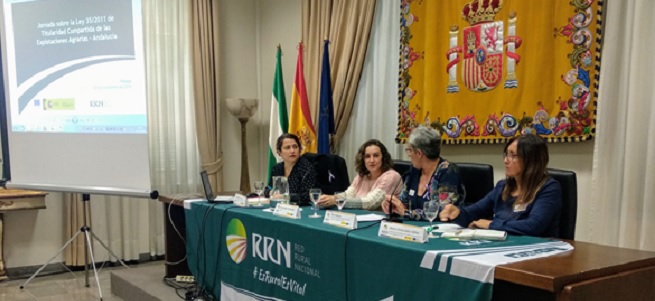
29 de November de 2019
Mujeres
November 29, 2019. Rural areas are characterized by a more masculine and aging population. To advance gender equality and combat depopulation, a task for which women play a key role, Law 35/2011 of October 4 on Shared Ownership of Agricultural Holdings was passed in 2011.
Improving awareness of this law among stakeholders is essential for achieving greater success in its implementation. Discussing the legal, economic, technical, and bureaucratic barriers that may arise from implementing this law has become a key component of the training activities developed by the Ministry of Agriculture, Fisheries, and Food (MAPA), as commented by Isabel Gimeno of the Subdirectorate General for Rural Development. Consequently, informational workshops on this subject are being held throughout Spain , with this being the ninth, this time held in Andalusia.
Each autonomous community has a different registration process for Shared Ownership . Marcelino Bilbao , from the Ministry of Agriculture, Livestock, Fisheries and Sustainable Development of the Andalusian Regional Government , has presented the case of Andalusia, as well as the opportunities available to the owners of these agricultural holdings, such as the easier granting of certain aid. Registering a farm under the shared ownership regime entails a series of tax implications and a series of advantages for Social Security , as commented by Pedro Ruiz , from the State Agency for Tax Administration in Malaga , and Sixto Bastazo , from the Provincial Directorate of the General Treasury of Social Security in Malaga, respectively.
Having the voices of women who have benefited from the Shared Ownership scheme has been a key element of the event in understanding the steps that must be taken, which in some cases have not been easy, and which can facilitate the decision of other women to register their farms under this regime. In this sense, the support work carried out by both women's associations and professional agricultural organizations has been confirmed, as highlighted by Rita Mateos , regional president of AFAMMER Andalucía, and María Inmaculada Idáñez , president of the CERES Confederation .
Although the number of participating farms has increased significantly over the last year and a half, further work is needed through comprehensive diagnoses and analyses that will allow for more satisfactory results in meeting the objectives of the Law. To achieve this, the National Rural Network has organized this event, which has allowed for the gathering of comments and discussion on aspects of the Law that could be improved, in order to achieve greater success in its implementation .
To delve deeper into all of the above, you can find the presentations used during the event at this link, in the topics section.









